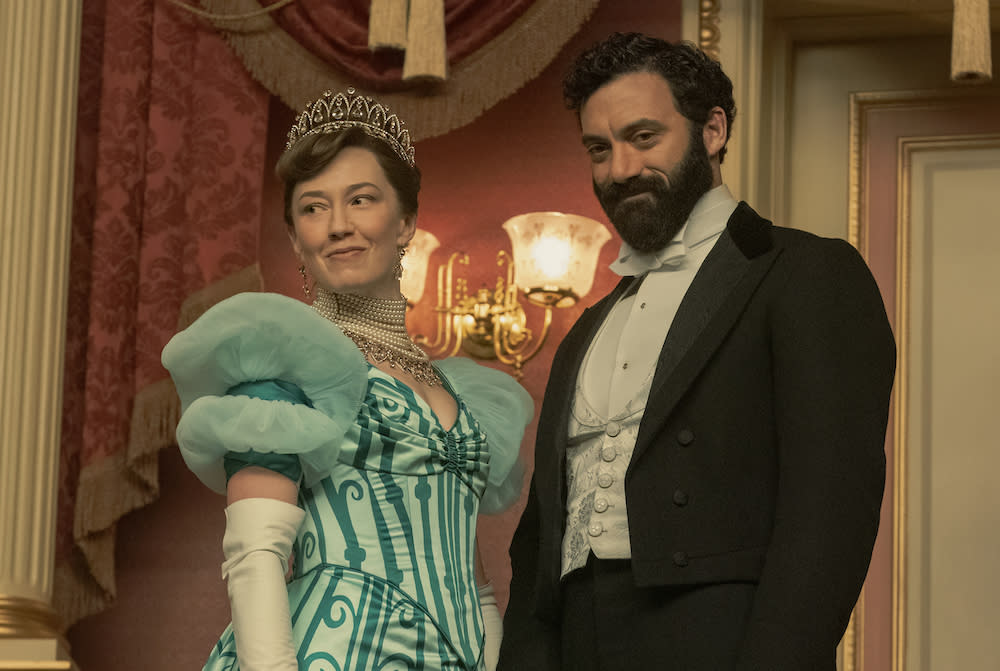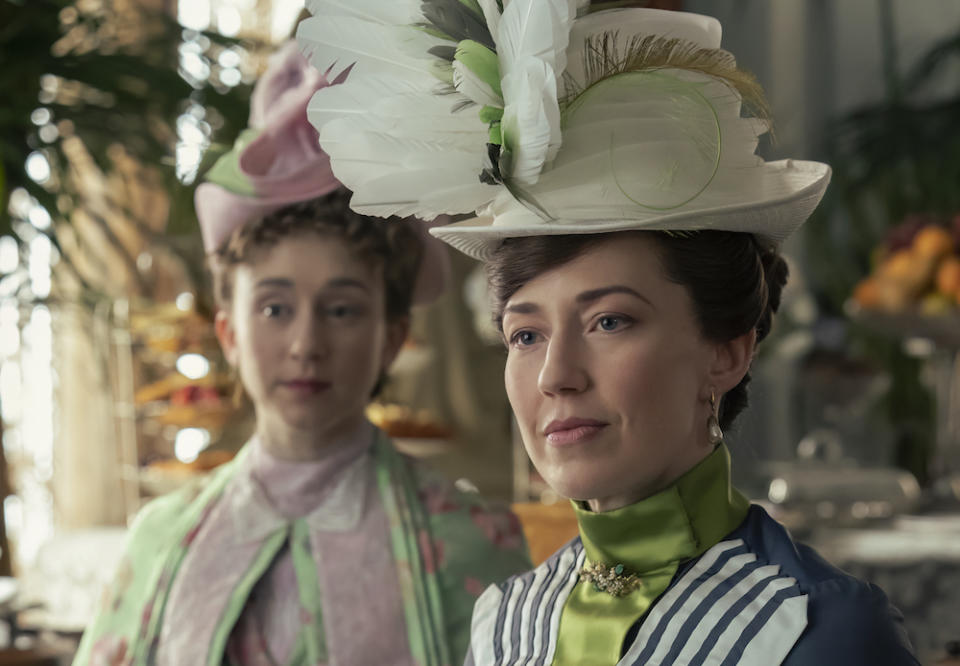Carrie Coon on ‘The Gilded Age,’ Her Favorite Tweets, and Bertha’s ‘Sexy Marriage’

- Oops!Something went wrong.Please try again later.

Carrie Coon is confused and under the weather, though the two don’t appear to be connected. At the tail end of her March press tour for “Ghostbusters: Frozen Empire,” the Emmy- and Tony-nominated actor caught a bug akin to bronchitis. “I don’t know if it’s bronchitis,” Coon said over Zoom. “I’m being dramatic… but that’s my job!”
Bronchitis or not, confusion isn’t one of her symptoms. It’s the result of a particularly complicated Emmy season. Typically held each September — a tradition that strains logic in and of itself, since no one really follows the old fall-to-spring broadcast television calendar anymore — the Emmys will be held twice in 2024. The 75th Primetime Emmys took place in January, after the original date in 2023 was pushed back to accommodate the WGA and SAG strikes, and the 76th Primetime Emmys are scheduled for September. The former honored shows released between June 2022 and May 2023, while, the latter will celebrate TV’s finest programs from June 2023 through May 2024.
More from IndieWire
Unit Photographers Get One Chance to Define an Entire Show - Here's How They Do It
'Lady in the Lake' First Look: Natalie Portman Is a '60s Housewife Turned Investigative Journalist
Keeping all that in mind without the brain-fog brought on by a head-cold is hard enough, so it’s no surprise Coon began our Emmy-pegged interview by saying, “I’m so confused — we’re eligible?” The “we” being referred to is Julian Fellowes’ “The Gilded Age,” which isn’t just eligible but expects to contend in multiple categories later this year — including Best Actress in a Drama Series, where Coon will be running.
The “Fargo” and “Leftovers” star plays Bertha Russell, an ambitious aristocrat from new money who’s been knocking down doors since arriving in New York. She successfully infiltrates high society via an elegant debutante ball in Season 1, then schemes to open a new, better opera house in Season 2, and Season 3 will undoubtedly give her and her husband, George (Morgan Spector), another fresh challenge — something Coon appreciates about the character. “Stasis is not as compelling as action,” she said. “Energy keeps moving. It doesn’t stop. So I think that’s what [Bertha and George] do, they provide that in the show. And on top of that, they have a very sexy marriage!”
Below, Coon discusses Bertha’s unique appeal, what may be in store for the character in future seasons, and her own courageous attributes: engaging with fans — and non-fans — on Twitter.
This interview has been condensed and edited for clarity.
You are brave enough to scroll Twitter after each episode premieres. You look at the tweets. You read the comments, which is the No. 1 thing people on the internet know not to do. Why?
Such a good question. I guess, masochism? [laughs] No, I’ve always read reviews. Even from my earliest days in theater, I’ve always read all the good reviews and all the bad reviews. I guess I was always interested to see how the work I was doing was landing in the world. And I think that’s because I always had opinions about it. I always tried to be objective about whether the thing I was in was good or not. I feel like I didn’t want to lose my way — I think that’s what it’s about.
Every now and then, a theater review gets in your head and gets in your way, but usually only for a couple of days, and then you can get rid of it. Also, my family is a tough-love kind of bunch, so maybe it’s just a little comforting in that way? Hearing people make fun of you, that’s our love language.
Do you search for hashtags, like #TheGildedAge? Or check certain accounts?
I mostly look at mentions. I’ll do a search when an episode is running, [but] it’s not something I do all the time. But Tracy and I love, particularly, when we encounter mean tweets about our marriage, our age difference.
Oh, great. Great tweets.
My favorite one was something like, ‘For some strange reason, I’m really attracted to Carrie Coon.’ We get a kick out of them, and then we repeat it over and over again. [They’re] not very nice, but it’s kind of funny!
That’s such strong mental fortitude. Bertha Russell is a character you’re going to keep coming back to, season after season, and that thing you said about a review getting in your head — that could happen every week, if you’re checking each episode.
I don’t know if it’s mental fortitude, but there may be an aspect of something I really believe in, which is not taking yourself too seriously. If you can’t read shitty remarks about yourself on the internet and realize the person doesn’t know anything about you, then you might be taking yourself too seriously. I think it’s more fun not to take yourself too seriously!
I guess that’s my problem then. I’ll get stuck on a stray comment or tweet about something I wrote, and then that remark lives in my head, like you said.
Ah, yes, well you fall into the realm of critic. You write criticism, and there’s a special place in hell for critics, and a special art devoted to pillorying, murdering, and punishing them. [laughs]

Fair! OK, when looking at Bertha in “The Gilded Age,” I wanted to start with a basic question about the character. What makes Bertha happy? In what scenario would she be her best, happiest self?
I will say, I don’t know if Bertha will ever be satisfied, which is a [key] distinction to make. She is, ultimately, a visionary, so there’s always going to be a bigger and brighter thing to aim for. She is a big-picture person. She would’ve made an incredible CEO, and that’s not available to her. There are some women, even now, who when their ambition is thwarted, they can be very destructive. Fortunately, Bertha has a way to channel her energy into a way that’s constructive. She’s building a MET for New York City that’s still around, and that’s pretty incredible, actually.
I think her ambition is her happiness — a Sisyphean bliss, of sorts. Does that make her a better TV character? Someone who is always looking for the next challenge, the next goal, a new opportunity?
Yes, certainly. I think that people root for Bertha and George because they’re driving the narrative. They’re the chaos agents. They’re the people forcing change. I think we all want to believe we’re capable of that. Sure, there are some people who are incredibly satisfied with where they are, but we all would like to think we are the kind of person who could create change in the world. So what they’re doing is compelling. Stasis is not as compelling as action. Energy keeps moving. It doesn’t stop. So I think that’s what they do, they provide that in the show. And on top of that, they have a very sexy marriage!
And their relationship drives their ambition. They fuel each other. How do you want to approach that?
Well, I will say that marriage was very much in the writing from the jump. That is a Julian Fellowes’ creation, absolutely. He always surprised me. For example, the issue with Turner that comes up. [A maid, played by Kelley Curran, who tries to sleep with Bertha’s husband in Season 1.] In a lesser show Bertha is just mad because there was a naked lady in her husband’s bed. But that’s not what it’s about at all. She trusts him. She doesn’t really believe he would cheat on her. She’s mad he withheld information, and information is power, and they operate at a level of disclosure that’s about honesty so they can continue those parallel tracks of social climbing and their business ambitions.
So I love that’s not what that argument was about, and I love that Bertha still showed up for the meeting with the labor leader [which is important to George’s business], because she’s not going to compromise their plan just because she’s upset with George. She’s going to uphold her end of the contract, no matter what. And eventually, him earning his way into her good graces by finding out where the Duke will be [in Season 2] is foreplay for them. They turn it into a game. It’s very titillating. When she’s about to compromise and say, “Maybe I should just take this box at the Academy,” he’s able to repeat her argument back to her and remind her to stay the course; that her ambitions are much bigger than that. And that’s very attractive! Female ambition is still very threatening, sadly. We don’t have a female president for a reason. Women: We’re too prepared! We’re over-prepared!
Too prepared, too capable.
And we’re shrill!
Because the show introduces this idea with George and Bertha’s rift, is there room in “The Gilded Age” to explore what her life would be like as a single person? Who doesn’t have the clout and status tied to her husband?
I think that would be a really interesting spinoff. [laughs] At the very least, I think we’ll see what will happen when there’s a big decision, like who Gladys [Bertha’s daughter, played by Taissa Farmiga] is going to marry. That’s going to create an incredible amount of tension. We’ve seen a little bit of it, but ultimately George is deferring to Bertha in this arena because it’s her purview. Ultimately, if Gladys is dissatisfied in that situation and it’s Bertha’s fault, then that will be a real test for them.
And we know from the amalgams Bertha’s based on, Alva Vanderbilt eventually got a divorce from her husband, married for love, and became a suffragette. She perhaps came to regret marrying [her daughter] Consuelo off to the duke, so it’ll be interesting to see Bertha, if nothing else, reckon with some of those choices she made once she starts to advocate for actual women’s suffrage — or, at least, suffrage for white women, which is what most of the ladies were up to in that time.
“The Gilded Age” is available on HBO and Max. Season 3 has been renewed. Season 2 is eligible for the 2024 Emmys in all drama categories.
Best of IndieWire
2023 Emmy Predictions: Who Will Win at the Primetime Emmy Awards?
2023 Emmy Predictions: Outstanding Documentary or Nonfiction Special
2023 Emmy Predictions: Outstanding Documentary or Nonfiction Series
Sign up for Indiewire's Newsletter. For the latest news, follow us on Facebook, Twitter, and Instagram.

